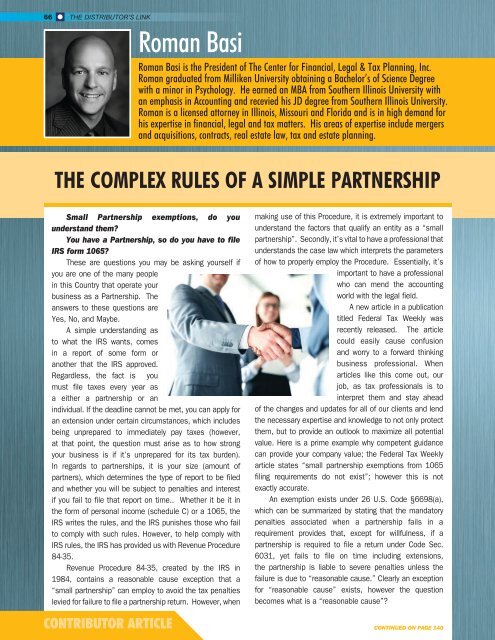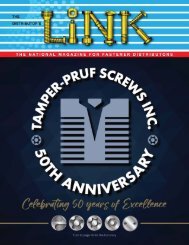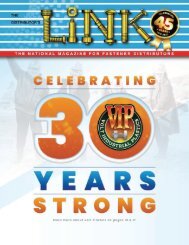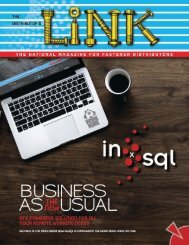WINTER 2018
Distributor's Link Magazine Winter Issue 2018 / Vol 41 No1
Distributor's Link Magazine Winter Issue 2018 / Vol 41 No1
Create successful ePaper yourself
Turn your PDF publications into a flip-book with our unique Google optimized e-Paper software.
66<br />
THE DISTRIBUTOR’S LINK<br />
Roman Basi<br />
Roman Basi is the President of The Center for Financial, Legal & Tax Planning, Inc.<br />
Roman graduated from Milliken University obtaining a Bachelor’s of Science Degree<br />
with a minor in Psychology. He earned an MBA from Southern Illinois University with<br />
an emphasis in Accounting and recevied his JD degree from Southern Illinois University.<br />
Roman is a licensed attorney in Illinois, Missouri and Florida and is in high demand for<br />
his expertise in financial, legal and tax matters. His areas of expertise include mergers<br />
and acquisitions, contracts, real estate law, tax and estate planning.<br />
THE COMPLEX RULES OF A SIMPLE PARTNERSHIP<br />
Small Partnership exemptions, do you<br />
understand them?<br />
You have a Partnership, so do you have to file<br />
IRS form 1065?<br />
These are questions you may be asking yourself if<br />
you are one of the many people<br />
in this Country that operate your<br />
business as a Partnership. The<br />
answers to these questions are<br />
Yes, No, and Maybe.<br />
A simple understanding as<br />
to what the IRS wants, comes<br />
in a report of some form or<br />
another that the IRS approved.<br />
Regardless, the fact is you<br />
must file taxes every year as<br />
a either a partnership or an<br />
individual. If the deadline cannot be met, you can apply for<br />
an extension under certain circumstances, which includes<br />
being unprepared to immediately pay taxes (however,<br />
at that point, the question must arise as to how strong<br />
your business is if it’s unprepared for its tax burden).<br />
In regards to partnerships, it is your size (amount of<br />
partners), which determines the type of report to be filed<br />
and whether you will be subject to penalties and interest<br />
if you fail to file that report on time.. Whether it be it in<br />
the form of personal income (schedule C) or a 1065, the<br />
IRS writes the rules, and the IRS punishes those who fail<br />
to comply with such rules. However, to help comply with<br />
IRS rules, the IRS has provided us with Revenue Procedure<br />
84-35.<br />
Revenue Procedure 84-35, created by the IRS in<br />
1984, contains a reasonable cause exception that a<br />
“small partnership” can employ to avoid the tax penalties<br />
levied for failure to file a partnership return. However, when<br />
CONTRIBUTOR ARTICLE<br />
making use of this Procedure, it is extremely important to<br />
understand the factors that qualify an entity as a “small<br />
partnership”. Secondly, it’s vital to have a professional that<br />
understands the case law which interprets the parameters<br />
of how to properly employ the Procedure. Essentially, it’s<br />
important to have a professional<br />
who can mend the accounting<br />
world with the legal field.<br />
A new article in a publication<br />
titled Federal Tax Weekly was<br />
recently released. The article<br />
could easily cause confusion<br />
and worry to a forward thinking<br />
business professional. When<br />
articles like this come out, our<br />
job, as tax professionals is to<br />
interpret them and stay ahead<br />
of the changes and updates for all of our clients and lend<br />
the necessary expertise and knowledge to not only protect<br />
them, but to provide an outlook to maximize all potential<br />
value. Here is a prime example why competent guidance<br />
can provide your company value; the Federal Tax Weekly<br />
article states “small partnership exemptions from 1065<br />
filing requirements do not exist”; however this is not<br />
exactly accurate.<br />
An exemption exists under 26 U.S. Code §6698(a),<br />
which can be summarized by stating that the mandatory<br />
penalties associated when a partnership fails in a<br />
requirement provides that, except for willfulness, if a<br />
partnership is required to file a return under Code Sec.<br />
6031, yet fails to file on time including extensions,<br />
the partnership is liable to severe penalties unless the<br />
failure is due to “reasonable cause.” Clearly an exception<br />
for “reasonable cause” exists, however the question<br />
becomes what is a “reasonable cause”?<br />
CONTINUED ON PAGE 140

















